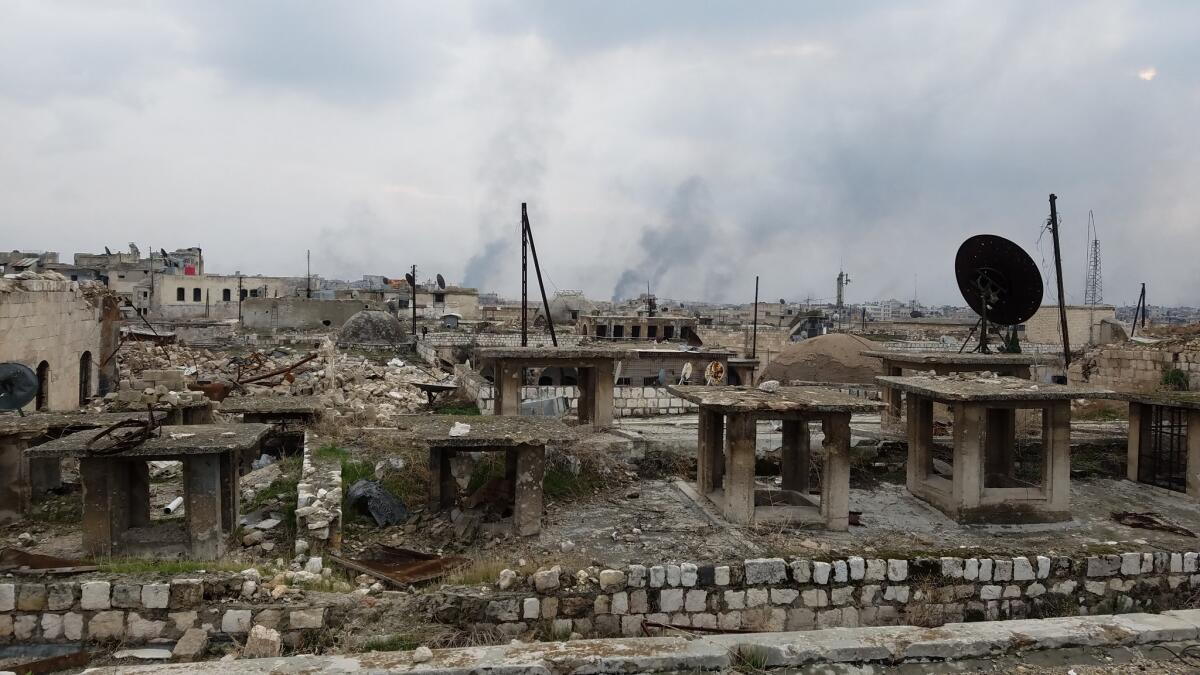Aleppo is back under government control, Syrian army says

Reporting from Damascus, Syria — After so much suffering, Aleppo is officially back under Syrian government control.
Syrian state TV announced Thursday that the evacuation of the city’s formerly rebel-controlled areas was complete, with the departure of the last opposition fighters and civilians from former strongholds in Aleppo’s eastern sector.
Rebels had held parts of the ancient crossroads city — much of it now a haunted, pulverized shell of itself — for nearly four years. Its fall is a major turning point in Syria’s multi-sided war, though the conflict is far from over.
The official end of the ferocious battle came via a Syrian army statement that was broadcast soon after the last four buses carrying fighters passed through the Ramousseh crossing amid bitter winter weather.
State television showed scenes of an eruption of celebratory gunfire and shouts of rejoicing from government forces and civilians in Aleppo’s western sector.
“God salute the army,” yelled one pedestrian as cars filled the streets.
Related: Bitter cold and an uncertain wait for the Syrians who made it out of Aleppo »
Aleppo’s humanitarian catastrophe was a paradox: The outside world was electrified by stories of desperate daily struggles on the part of those living there, often delivered firsthand via social media.
But at the same time, the drawn-out international hand-wringing — and repeated diplomatic demands for a lasting truce — did almost nothing to alleviate the carnage and hunger that stalked the city’s east amid months of intense Russian and Syrian bombardment.
With the city’s fall, the rebels will struggle to regroup and continue their battle against Syrian President Bashar Assad.
The army statement painted a picture of glorious victory.
“Thanks to the blood of our heroic martyrs, the heroic deeds and sacrifices of our armed forced and the allied forces, and the steadfastness of our people, the general command of the army and armed forces announces the return of security and stability to Aleppo,” said the televised statement, which was read by an army general.
It described the victory in Aleppo as a mortal blow to the “terrorism project and its supporters,” a rebuke of countries such as the United States that back Assad’s enemies.
The end had long been in sight, with the final, painful denouement playing itself out over recent days.
Rebels had agreed last week to a surrender of their last bastions, setting in motion a fitful and perilous evacuation.
The United Nations said about 35,000 civilians and combatants had been part of the final exodus by foot, private vehicles and buses. More than 4,000 left in the past 24 hours, according to the International Committee of the Red Cross.
Before the war, Aleppo was a thriving commercial center and Syria’s largest city, filled with architectural landmarks that had endured for thousands of years. Retaking the city, parts of which had been in rebel hands since 2012, marked Assad’s most significant victory against the opposition.
The Syrian leader, propped up for the past year by massive Russian firepower, has long characterized anyone opposed to his iron rule as a terrorist. As the conflict has dragged on, that has become something of a self-fulfilling prophecy, with jihadist groups coming to play a major role in the long rebel resistance.
Despite the government announcement, the United Nations estimated that thousands more people remained in the former rebel areas. U.N. spokesman Farhan Haq, speaking in New York, cited the “traumatic” process of evacuation, saying civilians endured crowding, cold and repeated delays.
At the height of their strength, rebels held nearly half of the once-thriving city. But the most intense bombardment of the nearly six-year war devastated infrastructure, including schools and hospitals, with fighters and civilians alike huddling underground or in half-ruined buildings.
The devastation that became a watchword for the city will likely soon have a new backdrop: the northwestern city of Idlib, which U.N. envoy to Syria Staffan de Mistura warned could be “the next Aleppo.” Thousands of people who fled Aleppo have taken refuge there.
Russian Defense Minister Sergei Shoigu said the country’s bombardment had killed tens of thousands of jihadist fighters and provided a bulwark against uprisings across the region.
Assad had hailed his Russian and Iranian allies, saying their joint offensive was a “step on the road to ending terrorism.”
The Syrian army, for its part, said the victory in Aleppo proves that the government can defeat the rebels. It vowed to fight on “until the “liberation of every grain of sand in Syria.”
Special correspondent Bulos reported from Damascus and staff writer King from Washington.
ALSO
Berlin attack suspect’s fingerprints in truck suggest he drove it
Car bombs explode at a suburban Mosul market, killing 15 civilians and 8 police officers
UPDATES:
3:10 p.m.: This article was updated with more details from the army statement.
1:40 p.m.: This article was updated throughout with staff reporting.
This article was originally published at 11 a.m.
More to Read
Sign up for Essential California
The most important California stories and recommendations in your inbox every morning.
You may occasionally receive promotional content from the Los Angeles Times.










